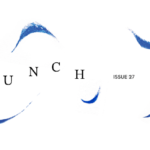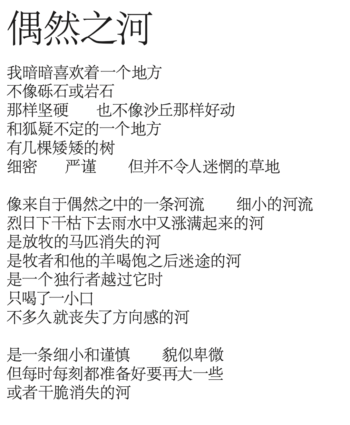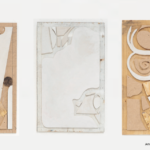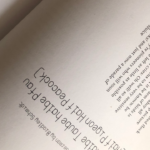“Nine,” the mother says.
“Is that a lot?” the daughter asks, pulling back the sheets. “I sleep with you and all my stuffed animals. That’s already maybe a gazillion.”
“I’m not counting stuffed animals. Do you want a bedtime story or not? If you just want to ask questions, you can go right to sleep, bunny. You know I have to go to a lot of trouble to tell you about the nine.”
“Story, please.”
“Have you done your teeth and toilet?”
The daughter nods so the mother begins.
*
The first was just for a night. Her boarding school was an alien place where she never felt she belonged (she had a full scholarship). The bed was hard and narrow and creaked whenever they moved. Though the mother had slept on it all year in the small room of her dorm, she hadn’t noticed how uncomfortable it was until he was there sharing the bed with her. He was older and had come to visit his girlfriend, her classmate, from his Ivy League college nearby.
“What was he like?”
“He was black. If I brought him home, Grandpa would have said bad things to him.”
“Why did you sleep with him, Mommy?”
The mother shrugs.
“We were drinking. People do foolish things when they drink.”
“He’s the one who kicked the blankets and twisted the sheets.”
“Yes,” the mother says, “We both made a huge mess.”
*
Number Two happened the summer before she started college. She knew him from school, but he never talked to her. It was only in the quiet of summer when they ran into each other at the drugstore that they had their first conversation.
Her immigrant parents encouraged her to see him. “They practically shoved me out the door and sold me to him,” the mother says, but mildly and without bitterness. “He was white and came from a rich family. That kind of guy who will always be alright, no matter what they’ve done.”
He drove them to the beach and then he just wanted to sleep.
“He just fell asleep? Isn’t that weird?”
The mother shrugs.
“Why did you sleep in the car with him? Were you tired?”
“I was. Very, very tired of it all, especially my parents. Never sleep in a car with a boy you don’t know that well. It’s uncomfortable and you don’t want to be thought of like that.”
“Like what, Mommy?”
“Like the kind of girl who would sleep just anywhere. You want to be a girl who only sleeps in a feather bed and sends boys all around the world just to fetch you a silk pillow.”
“Why would they have to go so far to get a pillow? Couldn’t they just buy one at the store?”
“Because you want someone who’d get you something so special that it won’t leave creases on your cheek.” The mother sighs. “You have to understand, if I didn’t sleep, there would’ve been nothing else to do. And I was kind of excited, too, before I went. I liked him before that.”
“Did you have bad dreams sleeping in the car?”
“Yes. Terrible dreams and nightmares about monsters who lurk in the dark.”
*
“Wait,” the daughter says, holding up her little hand before the mother can get to Number Three. “Do the monster check.”
The mother hangs her head over the side of the bed until her dark hair brushes the floor. All she sees in the dim light is dust and stuffed animals that have fallen through the crack between the bed and the wall.
“It’s clear.”
“Then why do I still have bad dreams?”
“Sometimes monsters are invisible. They hide in the crevices of things and even in people, behind the faces they wear every day. They feed on secret things, the things you can never tell anyone, like this story. If you repeat it, you might invite monsters in. Do you understand?”
“I won’t tell. I don’t like monsters.”
“Good.”
*
She was in college by Number Three – a state school with financial aid, she was the first in her family to go. He was in her American History class. He took long, hot showers after they slept, as if he wanted to wash all the sleep away.
“Did he wash the sheets, too?”
“Maybe. From the way he washed himself in those showers, he probably had a lot of laundry.”
“Didn’t you sleep with Grandma and Grandpa? Why weren’t they the first two?”
“I never slept with them,” the mother says as she stiffens but seems to rise taller, even though they’re both lying on the bed. “I always slept on my own. Even at sleepovers. I never got too close to anyone. I never shamelessly climbed in the way you do. I don’t know why you bother. You have such a lovely bed.”
“Yes,” the daughter says, fluffing her feather comforter and resting her head back onto her pink pillow, safe under her net canopy. “But it’s cozier with you. And I get scared.”
“You should stay in your bed,” the mother says.
“My number is one,” the daughter says.
*
Four was someone the mother liked but met in passing. She noticed him right away. He had a lion’s mane of blond, curly hair. They were traveling on the same bus in a foreign country. Before they slept, they took a walk. They were the only two who wanted to see the village nearby. People warned them not to go because it was unlucky. But they were curious.
Dirty children blocked the path there, taunting them and throwing rocks. Though she hadn’t believed it before, the mother was sure she could feel the bad luck.
“We should turn around,” she whispered. As they made their way back, Four put his arm around her like he was protecting her from the bad things behind them that they both had felt.
That night they shared a bed. They were dusty from the road, but he didn’t seem to mind.
*
Five and Six didn’t happen but they’re still part of the list.
She’d parted ways with the man with the lion’s mane and lost her passport. This time she was hitchhiking in a car with another American – safe, she thought, not knowing that the taillight of his car was out and that it would give the police an excuse to stop them.
They waved the driver on. The mother had no identification, so they took her to jail.
The two arresting officers told her that she had to sleep with one of them.
Five was tall, young, and good-looking. Six was old and squat.
You choose, they said.
The mother was very dark and brown from the sun. She was wearing a filthy cotton dress that looked like a sack. If she’d even had a shower, she was sure they wouldn’t have given her a choice. But she was female, and they were bored that day.
She chose the old, ugly one.
“I knew that the tall and handsome one would want to sleep right away,” the mother explains, “He looked used to getting his way. Because he was handsome, I knew he would be brutal. So I chose the old one. He looked like he could be tricked. I just used my hand.”
“What for?”
“To cover his eyes so he would think that he was sleeping without really having to sleep. You probably wouldn’t have known to do that, would you, bunny? You would have chosen the tall, handsome one.”
The daughter nods, shyly.
When the first light filtered in through the bars of her prison window, the mother called out to the tall, handsome officer and prostrated herself before him.
Remember your mother and your sister, she cried. Remember the Virgin Mary!
“Then what happened?”
“He let me go and I got a new passport.”
*
The real Number Five was Henry, a potter who lived with the mother in a big house they shared with other people who came and went like the rabbits she let run wild. She was still in college but older at this point – wiser, she had thought, from travelling.
The rabbits multiplied. One day, they chewed through the electrical wires, and the house burnt down.
“You wouldn’t know what that’s like,” the mother says. “You love your things too much. If something like that happened, you might die just staying with your things. Or you would get caught in the fire while you were trying to take them with you.”
The daughter makes a face but then asks, “Was the man who owned the house very mad?”
“Actually, insurance gave him more money than the house was worth, so it seems the rabbits did him a favor. That’s karma for you.”
For just a little while, before the house burned down, it had been nice: the mother liked Henry and he had liked her back. After they moved, he started liking someone else.
“It’s what always happens,” the mother says. “I’m the last one before they marry someone else.”
The one that Henry liked had a name that began with N. All the mother’s enemies have N names. The daughter, too, has a name that begins with N. The mother named her with the hope that the daughter would grow up with all the advantages of her nemeses.
The daughter knows who Henry is because he still sends the mother packages. She smiles a secret smile when they arrive and passes them over to the daughter, who rips open the paper. The daughter drinks hot chocolate out of a perfectly weighted mug that Henry made. In the summer evenings, she holds Japanese fireworks that he sends, while the mother lights their ends. They burn slowly in soft explosions that look like stars and snowflakes.
*
“Why do boys like to sleep so much?” the daughter yawns.
“They want to be close to someone when they sink into their subconscious.”
“If you’re both asleep why does it matter?”
“It’s the same reason you climb into bed with me. It’s comforting. But sleeping with someone else – even me – can be dangerous, too. Sometimes your dreams mix together and then you get mixed up in the other person. You don’t know where you start and where they end. But it can be nice to lose yourself like that, and not have to be completely responsible and enclosed inside your own body.
“Also,” the mother continues after thinking a little, “it makes them taller. Boys like to be tall. Right after they sleep, all the gravity makes them taller than before. Just for a little bit, not permanently. Then they walk around all day, and the gravity fights their bodies, so they get shorter. But for boys, that little moment they’re taller, it still counts.”
“Should I sleep more so I can be tall, too?”
“No. The best thing you can do is to sleep soundly and not wake in the night. I know you creep to the bathroom, but try to sleep, little bunny. Monsters lurk in the dark. It’s better if you don’t see them and just let them pass by without knowing that you’re there. Only wake after they’re gone.”
*
Six was George, the mother says, trying it out loud, and wondering if it’s true. She’s muddled up the timeline at this point. She can’t account for everyone, and nine seems like a decent enough number, not too big or small.
Six wasn’t important – that’s all she knows.
The daughter nods because she knows he belongs in the list.
George liked the mother but sleeping with him was just like sleeping with a brother.
“But you want to be safe when you sleep next to someone,” the daughter says. “Sleeping with someone like family is better, isn’t it?”
“Sometimes,” the mother agrees. “But sometimes you want to sleep next to someone who isn’t like family at all. They help you dream different dreams.”
*
Seven was the one who got away. He was older, a graduate student she watched as he biked across campus. She knew he would be important one day. He surprised her by walking right into the library where she worked. That’s when they really met.
He was half-Japanese, half-white, serious and tall.
She liked the way he considered everything she said, but that was the problem, too – he took everything she did so seriously, all her moods and crying jags and silly, crass jokes.
“I was too messy for him,” the mother sighs. “He was more comfortable with someone more cultured, of his own class. He married a prettier, nicer version of me. Everyone said that she reminded them of me. Sometimes she sends a Christmas card and signs his name for him. I always throw those away.”
*
The daughter’s father was Eight. The first time the mother saw him he was standing on his head in an ashram in India where the mother had gone to find herself.
He told the mother about a girl he’d met there who could see auras. She had told him that his aura was white. White was rare, he explained, it meant that he was a very spiritual person. He was at the ashram because he had left the Zen temple where he was training to become a Buddhist priest. He didn’t like the rituals – the toilet cleaning and all the repetition – and wanted to see if there was something better.
They didn’t talk about the past or the future because it was not something the mother was thinking about (if they did, she couldn’t remember it). She was still thinking about the seventh man who hadn’t loved her enough.
She wondered if her aura was black and was glad the girl who could see auras had left the ashram before she’d arrived.
They hiked together and slept outside on a holy Tibetan mountain.
The mother had vaguely decided to travel on and work with Mother Teresa. But she had a change of plans.
“I was in your belly!” the daughter cries. “Tell me again how I got there.”
“While I was sleeping, a deity must have snuck you inside. Be careful where you sleep. You’re more vulnerable, and it’s easy not to notice things when you’re distracted by your dreams. Sleeping in a holy place means that mischievous gods are around. I can’t recommend it.”
“But you’re not mad that they put me in there?”
The mother strokes the daughter’s hair and says, “Shhh.”
*
“Next time will you tell me the story of the giant boob that rolls down the hill?” the daughter murmurs. Her eyelids are heavy, though she fights to keep them open. “I like that one. I can’t remember if it smashes the city or not.”
“Maybe tomorrow.”
“And the milk that comes out, I can’t remember if it saves the people or drowns them. I can’t remember if it’s a happy story or not.”
The daughter blinks her eyes and furrows her brow. She’s half-asleep but awake enough to know that something isn’t right.
“I’m sure there was another one after that. I thought there was someone else after Daddy? A handsome prince who was gentle and kind?”
“Not tonight.”
Through her yawn the daughter continues, “Wasn’t there also one before, at the beginning, a monster? And a girl? I remember a girl.”
“Go to sleep, my Nine. You know that there are always nine.”
“But—” the daughter protests but her eyes are closing.
“Stories change. Sometimes they get confused with your dreams when you’re already drifting off so you can’t remember them exactly right even if you try.”
“Please stay with me after I’m asleep,” the daughter says. “I don’t want to be alone.”
*
The daughter lies heavy in her pink bed. She looks like a doll next to all her stuffed animals, which are buried in the crack between the bed and the wall to protect her from the monsters. She smells of bath soap mixed with her own sour smell.
The mother climbs in under the cool sheets and lets her head fall onto the pillow. She feels the warmth of the daughter’s body beside her. Then she closes her eyes and sleeps.
Emi Benn’s fiction has appeared in Joyland, Jellyfish Review, Monkeybicycle, Vol. 1 Brooklyn, and other publications. She lives in Hamilton, Ontario. This piece appeared in SAND 20: Taboo and is available online for a limited time.
KEEP ON READING
From Pantyhose for Daisy by Dewi de Nijs Bik tr. Emma Rault
Poetry | Issue 26: Shifting (translated








